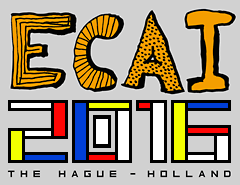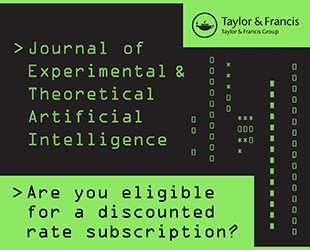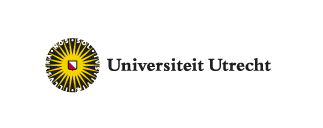For program details about the tutorials, the main conference or the collocated STAIRS conference, please visit their respective pages.
Africa
W2 AI4J – AI for Justice
Organizers: Floris Bex, Tom van Engers, Henry Prakken and Bart Verheij
Contact: Henry Prakken
Website: http://www.ai.rug.nl/~verheij/AI4J/
Description: Artificial intelligence is currently in the centre of attention of legal professionals. An abundance of startup companies explore the application of AI techniques in the domain of law, and there is even speak of artificially intelligent legal assistants disrupting the legal market space. Factors driving the increased attention for legal AI include recent technological breakthroughs in machine learning, natural language processing, ubiquitous computing, data science, and argumentation technology, the changing attitude towards technology in the legal domain and the much increased availability of legal data on the internet. The aim of this workshop is to investigate opportunities and challenges in AI applied to the law, with a particular focus on the relevance of the recent technological breakthroughs for AI & Law research and for legal practice.
Oceania
W4 – AI:Context – Multimodal Analytics – Internet of Things
Organizers: Constantine Spyropoulos, Georgios Pierris, Grigoris Tzortzis, Stefanos Vrochidis, Maite Melero, Leo Wanner, Jens Grivolla, Yannick Esteve, Jörg Cassens, Rebekah Wegener, Anders Kofod-Petersen
Contact: Constantine Spyropoulos, Stefanos Vrochidis, Jörg Cassens
Website: http://ecaiws.kriwi.de/
Description: Artificial Intelligence (AI) plays an increasingly important role in modern IT applications. The Internet of Things (IoT) has to deal with a large variety of multimodal sensor data that needs to be represented in ways that facilitate reasoning techniques to search for and analyze the right data or services content taking also into account contextual information. This workshop looks at the upcoming challenges for AI from three different perspectives with a common theme. A special track “Artificial Intelligence and Internet of Things” aims at providing the ground for disseminating new and interesting ideas on how AI can make valuable contribution for solving problems that the Internet of Things ecosystem faces. The track “Modelling and Reasoning in Context” aims to bring together researchers and practitioners from different communities to study, understand, and explore modelling and reasoning issues and approaches for contextualised systems. Further on, the track “Multimodal Data Analytics” welcomes novel research works that deal with web content extraction, concept and event based indexing, semantic integration and retrieval, as well as multimodal fusion, content summarisation and visual analytics.
Africa
W5 – ALAW – Agents Living in Augmented Worlds
Organizers: Alessandro Ricci, Cristiano Castelfranchi, Gregory O’Hare, and Luca Tummolini
Contact: Alessandro Ricci
Website: http://alaw2016.apice.unibo.it
Description: The workshop aims at being an inter-disciplinary forum where to discuss any aspect that concerns agent-based augmented worlds, i.e., augmented/mixed reality systems – possibly integrated with a pervasive computing fabric – that are conceived, modelled and designed in terms of agent and multi-agent systems. Aspects range from conceptual and theoretical foundations, up to their design and engineering, as well as their application to specific domains.
South America
W6 – AMiLP – The 1st International Workshop on Ambient intelligence for Large Premises
Organizers: Rubén Fuentes-Fernández and Marin Lujak
Contact: Rubén Fuentes-Fernández
Website: http://grasia.fdi.ucm.es/amilp2016/
Description: Ambient Intelligence (AmI) is intended to provide users with systems tightly integrated with their everyday environment and activities. The goal is minimizing the need of explicit actions by users, through the continuous and distributed gathering of information and actuation devices. With the advances in the field, AmI is pursuing growingly ambitious goals in terms of the size of its smart spaces, the number of served users, and the level of adaptation to them. This workshop will be focused on the particular challenges and potential solutions that appear when AmI moves to Large Premises (LP). In this context new requirements appear to understand big groups of people moving in premises that fall beyond the classical closed and controlled environments of most AmI systems. The ways of interaction, the expected services, and the behaviour of people acquire a new dimension and variability. Systems need to adapt to these crowds using large numbers of multiple and heterogeneous resources, in distributed and frequently unfriendly environments that cause changes in the system topology.
Asia
W7 – Artificial Intelligence for Diabetes
Organizers: Beatriz López, Clare Martin, and Pau Herrero
Contact: Beatriz López
Website: https://sites.google.com/a/brookes.ac.uk/aid1/
Description: The complexity of the decision-making involved in diabetes management has led Artificial Intelligence (AI) to become a key technology for empowering both patients and caregivers in their everyday life. Several publicly-funded projects have been created to deliver decision support for people with this condition such as: TIDDM, EMPOWER, MOBIGUIDE, and the newly formed PEPPER project. However, there is still a lot of work to do. The aim of this workshop is to assimilate lessons learned, and to determine future goals, to help us work towards finding definitive, compatible and complementary tools for people with this condition. To that end, the AID workshop seeks to encourage discussion among different researchers actively engaged in finding Artificial Intelligence-based solutions to problems associated with diabetes. Possible outcomes include further collaborations, the setup of a living survey and a roadmap for future editions of the workshop.
Antartica
W8 – EWCD2016 – European Workshop on Chance Discovery, Data Synthesis, Curation and Data Market
Organizers: Akinori Abe, Yukio Ohsawa, and Lorenzo Magnani
Contact: Akinori Abe
Website: http://ultimaVI.arc.net.my/ave/ECAI2016/
Description: This workshop will discuss several problems in Chance Discovery. Chance Discovery is a research to study how to discover rare or novel events causing potentially significant situation. Although the event itself could not be significant. A chance might be computationally or manually discovered. Accordingly, advanced computational techniques such as abduction and induction (including data mining) could be applied to Chance Discovery. In addition, it is important to discuss effective chance evaluation, selection, and suggestion methods. It would be a gate for fantastic and innovative applications. Thus, we would like to discuss from logical, computational, cognitive, sociological, economical and psychological (perhaps more) viewpoints.
Kilimanjaro 1
W9 – CIMA-16 – 6th International Workshop on Combinations of Intelligent Methods and Applications
Organizers: Ioannis Hatzilygeroudis and Vasile Palade
Contact: Ioannis Hatzilygeroudis
Website: http://aigroup.ceid.upatras.gr/cima2016/
Description: CIMA-16 is a forum for exchanging experiences and ideas among researchers who are dealing with combining intelligent methods either based on first principles or in the context of specific applications. So, CIMA-16 is interested in submissions that refer to integrated or hybrid approaches that involve methods from any AI related domain, such as hard computing (e.g. logic, rules etc), soft computing (fuzzy logic, neural nets, genetic algorithms etc), machine learning (classifiers, clustering methods etc), and in their use in any application domain (medicine, biology, education, business etc).
North America
W10 – COIN++@ECAI2016 – Workshop on Coordination, Organisation, Institutions, and Norms in Multi-Agent Systems
Organizers: Julian Padget, Ana Paula Rocha, Joris Hulstijn, Gabriella Pigozzi, Harko Verhagen and Serena Villata
Contact: Julian Padget
Website: http://www.cs.bath.ac.uk/coin@ecai2016
Description: Coordination, organizations, institutions and norms are four key elements in governance, and the COIN workshop series constitutes a space for debate and exploration of these four elements for the design and use of open systems. We seek to attract high-quality papers and an active audience to debate mathematical, logical, computational, methodological, implementation, philosophical and pragmatic issues related to the four aspects of COIN. At ECAI, COIN is joined by NorMAS to become COIN++. NorMAS focuses on one of the COIN aspects, namely normative multi-agent systems; systems in the behavior of which norms play a role and which need normative concepts in order to be described or specified. A normative multi-agent system combines models for normative systems (dealing for example with obligations, permissions and prohibitions) with models for multi-agent systems.
Asia
W11 – COREDEMA 2016 – Workshop on Conflict Resolution in Decision Making
Organizers: Reyhan Aydoğan, Tim Baarslag, Enrico Gerding, Catholijn M. Jonker, Vicente Julián and Victor Sanchez-Anguix
Contact: Reyhan Aydogan
Website: http://ii.tudelft.nl/coredema2016
Description: The focus of this workshop is on theoretical and practical computational approaches for solving and understanding conflict resolution. These computational approaches may be inspired by a wide variety of disciplines such as anthropology, psychology, economy, biology, statistics, mathematics, and computer science itself. Indeed, one of the goals of this workshop is to allow researchers from different disciplines to discuss their perspectives on conflict resolution. We particularly emphasize the role of computational models and applications of conflict resolution in relation to decision making and action selection.
Central America
W12 – The 3rd International Workshop on Defeasible and Ampliative Reasoning
Organizers: Richard Booth, Giovanni Casini, Szymon Klarman, Gilles Richard, and Ivan Varzinczak
Contact: dare.to.contact.us@gmail.com
Website: http://dare2016.yolasite.com/
Description: There are expressions of human cognition for which the development of logical formalisations is desirable but particularly problematic, since classical reasoning cannot be straightforwardly applied. Some typical examples are reasoning with uncertainty, exceptions, similarity, vagueness, incomplete or contradictory information and many others. They often show two strongly intertwined aspects: (1) ampliative aspect – the ability to make inferences that venture beyond the scope of the premises, in a somehow daring but justifiable way; (2) defeasible aspect – the ability to backtrack one’s conclusions or to admit exceptions in reasoning. The goal of the DARe workshop is to present latest research developments on the aforementioned aspects of reasoning, to discuss current directions in the field, and to collect first-hand feedback from the community.
North America
W13 – Diversity 2016 – International Workshop on Diversity-Aware Artificial Intelligence
Organizers: Michael Rovatsos and Ronald Chenu-Abente
Contact: Michael Rovatsos
Website: https://www.essence-network.com/essence-events/international-workshop-on-diversity-aware-artificial-intelligence-diversity-2016-at-ecai-2016/
Description: The workshop seeks to explore diversity as a phenomenon that both poses a challenge for AI in terms of dealing with and managing diversity in an intelligent system or ecosystem of intelligent human and/or artificial agents, and presents an opportunity in terms of leveraging diversity – for example through processes like crowdsourcing and collaborative knowledge production – to achieve human-like (and human-friendly) capabilities in more open-ended, incrementally evolving, and interactive AI systems. The workshop will provide an open forum for researchers from different areas of AI to contribute their insights on diversity in order to develop a shared agenda for future research on the topic. We welcome submissions on all aspects of diversity, ranging from theoretical foundations to practical applications, case studies, and surveys.
South America
W14 – EGPAI – Evaluating General-Purpose AI
Organizers: Christos Dimitrakakis, Jose Hernandez-Orallo, Martin Sandsmark, Claes Strannegård, and Kristinn R. Thórisson
Contact: Jose Hernandez-Orallo
Website: http://users.dsic.upv.es/~flip/EGPAI2016/
Description: The aim of this workshop is to evaluate general AI systems. Most AI systems are tested on specific tasks. However, to be considered truly intelligent, a system must be flexible enough to be able to learn how to perform a wide variety of tasks, some of which may not be known until after the system is deployed. This workshop will examine formalisations, methodologies and testbenches for evaluating the numerous aspects of this type of general AI systems. We are interested in theoretical or experimental research focused on the development of concepts, tools and clear metrics to characterise and measure the intelligence, and other cognitive abilities, of general AI agents.
Antartica
W15 – Ethics in the Design of Intelligent Agents
Organizers: Grégory Bonnet, Maaike Harbers, Koen Hindriks, Michael Katell, and Catherine Tessier
Contact: Grégory Bonnet
Website: http://ii.tudelft.nl/edia2016/
Description: Intelligent agents increasingly decide, act and interact with humans and agents in shared and dynamic environments. Search engines, self-driving cars, electronic markets, smart homes, military technology, software for big data analysis, and care robots are just a few examples. As the scope of intelligent agents’ activities broadens, it is important to ensure that such socio-technical systems will not make irrelevant, counter-productive, or even dangerous decisions. This workshop focuses on two main questions: (1) what kind of formal organizations, norms, policy models, and logical frameworks can be proposed to deal with the control of agents’ autonomous behaviors in a moral way?; and (2) what does it mean to be responsible designers of intelligent agents?
Central America
W19 – PrAISe 2016 – The International Workshop on AI for Privacy and Security
Organizers: Jose M. Such, Natalia Criado, Martin Rehak, Ozgur Kafali, Pinar Yolum and Nadin Kökciyan
Contact: Jose Such
Website: http://mas.cmpe.boun.edu.tr/praise2016
Description: Research in security and privacy is nowadays one of the hottest topics in computer science. This is because these topics are of capital importance to the development of a sustainable, resilient and prosperous cyber world. This includes protecting crucial assets ranging from Critical Infrastructures to individual’s Personal Information, and it spans domains like Cloud computing, Social Computing, Internet of Things, Electronic Commerce and many more. Approaches that are intelligent and self-adaptable are required to deal with the complexities of effectively protecting these crucial assets in all these domains. This is where research from the AI community can make a difference in security and privacy. Indeed, these two areas are increasingly receiving more and more attention from the AI community. The focus of the International Workshop on AI for Privacy and Security (PrAISe) is to provide a forum to discuss and advance security and privacy by means of *AI approaches*.
Kilimanjaro 2
W22 – What Can FCA Do for Artificial Intelligence
Organizers: Sergei O. Kuznetsov, Amedeo Napoli and Sebastian Rudolph
Contact: Sergei Kuznetsov
Website: https://fca4ai.hse.ru/2016
Description: Formal Concept Analysis (FCA) is a mathematically well-founded theory aimed at data analysis and classification that can be used for many purposes, especially for the needs of Artificial Intelligence (AI). The objective of the workshop is to investigate two main issues: how can FCA support various AI activities (knowledge discovery, knowledge representation and reasoning, learning, data mining, NLP, information retrieval), and how can FCA be extended in order to help AI researchers to solve new and complex problems in their domain.





